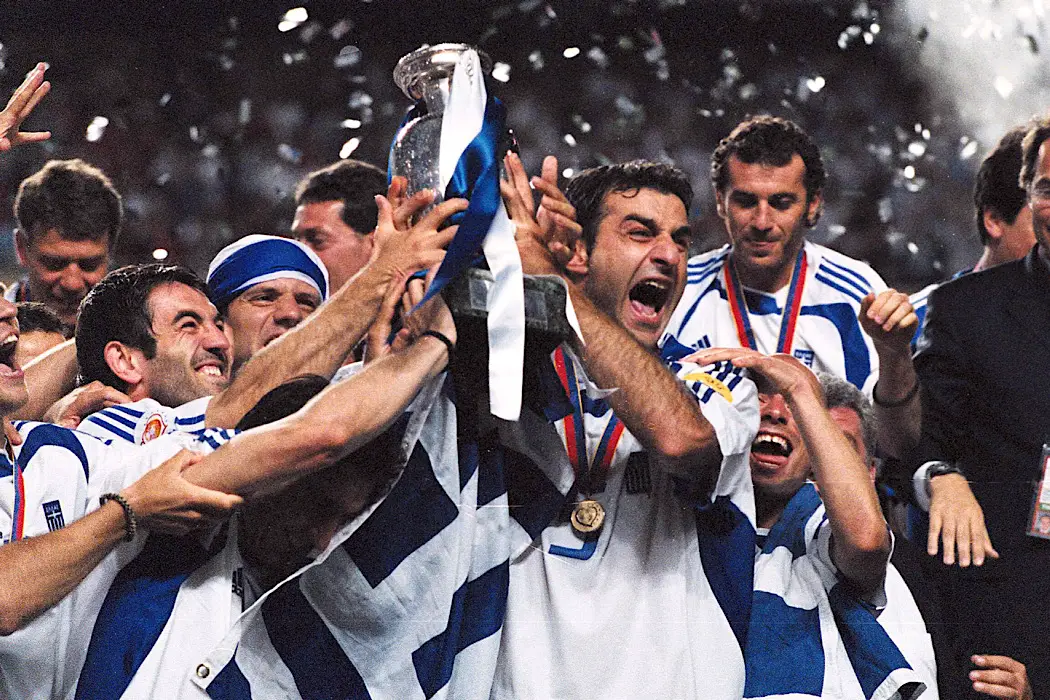KING OTTO: The Power of the Underdog

Lee Jutton has directed short films starring a killer toaster,…
What countries do you think of when you think of great football powerhouses? Perhaps Brazil, with its record five men’s World Cups and legendary players ranging from Pele to Neymar. Or Germany, about whom it was infamously said that “Football is a simple game: 22 men chase a ball for 90 minutes and, in the end, the Germans always win.” Maybe even England, the country that takes credit for the birth of the sport and hosts the most popular domestic league in the world, the Premier League.
Greece is probably not a name towards the top of your list—hell, probably not even in the top half. Yet that’s why their victory at Euro 2004 is so legendary. How did a team with no real reputation or big international stars find themselves lifting their first—and, to this date, only—major trophy? That’s the story told by King Otto, a feature-length documentary directed by Christopher André Marks that revisits Greece’s famous underdog victory with a particular focus on the man who inspired the team to win.
Football Royalty
That man? “King” Otto Rehhagel, a German with a lengthy career as both a player and a coach in Germany’s domestic league, the Bundesliga. Back in 2001, Rehhagel was contemplating his next steps. He had never coached a national team, but his native Germany had just hired a friend of his for that role; he had never coached abroad either. So when Vassilis Gagatsis, the President of the Greek Football Federation, decided that Greece could benefit from some of that much-vaunted German influence in the lead-up to Euro 2004, he gave Rehhagel a call. And Rehhagel, eager for a challenge unlike any he had ever taken on before, said yes.

As the man from whom the film takes its name, Rehhagel is unequivocally the star of King Otto. Now in his early 80s and retired from coaching, he still has a spirit and a sparkle that make it easy to understand how he was able to revamp the entire culture and identity of the Greek national team. Seated on a majestic throne-like chair in the middle of an expansive hall for much of the film, Rehhagel radiates confidence in his abilities as a coach and passion for the game that has been his entire life. When he starts bombastically singing the Greek national anthem, you’ll be ready to run through a wall for him even if you have no idea what he’s saying.
When Rehhagel arrived in Greece, he had a decidedly German perspective on things. He expected thousands to show up and watch the team train, but the public remained indifferent. He shouted blunt instructions and sharp criticism at a team that wasn’t used to such hard-nosed discipline; it didn’t help that he didn’t even speak their language. But with the hiring of Ioannis Topalidis—a German-born Greek football scout who became Rehhagel’s right-hand man and translator—the gulf between Rehhagel and his team slowly but surely was bridged.
Cultural Exchange
Topalidis is another great character who deserves the spotlight he is given in King Otto; the scenes he shares with Rehhagel, including the two of them revisiting the Olympic Stadium in Athens where they celebrated their triumph after returning from Euro 2004, are some of the most engaging in what is already a fascinating film. It’s clear that his hiring was key to the ultimate Greek victory; without his ability to translate across languages and cultures, no amount of tactical acumen on the part of Rehhagel—however considerable—would have been able to turn this team around.
Yet as one sees throughout King Otto, differences like language barriers are largely superficial when it comes to who we actually are as people; we all have more in common than we might initially think and would do well to remember that. As Gagatsis says towards the end of the film, “I wanted Otto Rehhagel because he was German, but I never imagined this German would have the heart of a Greek.” It might sound a bit corny, but in the context of the film, it’s a powerful statement that truly embodies the arc of the story.

In addition to Rehhagel, Topalidis, and Gagatsis, many of the Greek players are also interviewed on camera in King Otto. The film seamlessly blends archival footage from games and interviews nearly twenty years ago with these modern-day segments to create a portrait of a very special time in football history that has never really been replicated since—by Greece or anyone else, really. The key, as Rehhagel and others explain, was a set of defensive, counter-attacking tactics that Rehhagel describes as a controlled offense. This clear tactical identity, which never wavered during the tournament even as people around the world complained that the Greek style was “ugly” and overly defensive, played to the team’s strengths and gave them the confidence to defeat the reigning European champions, France, and the tournament’s host nation, Portugal, on their way to the European title.
Marks begins King Otto with a quote from Homer’s Odyssey and leans into the notion that Greece’s victory at Euro 2004 was a case of modern mythmaking—and it’s hard to argue with the evidence presented here. We don’t get a thorough overview of Rehhagel’s life and career, nor do we see every minute of the tournament that ensured he would be a hero to Greeks for all time, but the film hits all the highlights necessary to tell a truly compelling story. With a running time of only 80 minutes, it’s a short and sweet little film that any sports fan should enjoy.
Conclusion
Even if you don’t remember Greece’s triumph at Euro 2004, you’re guaranteed to be moved by King Otto and the way its subjects overcame difficulties and differences to achieve greatness.
What do you think? What great sports stories do you think deserve to have documentaries made about them? Share your thoughts in the comments below.
King Otto was released in the U.S. on March 25, 2022. You can find additional release dates here.
Watch King Otto
Does content like this matter to you?
Become a Member and support film journalism. Unlock access to all of Film Inquiry`s great articles. Join a community of like-minded readers who are passionate about cinema - get access to our private members Network, give back to independent filmmakers, and more.
Lee Jutton has directed short films starring a killer toaster, a killer Christmas tree, and a not-killer leopard. Her writing has appeared in publications such as Film School Rejects, Bitch: A Feminist Response to Pop Culture, Bitch Flicks, TV Fanatic, and Just Press Play. When not watching, making, or writing about films, she can usually be found on Twitter obsessing over soccer, BTS, and her cat.












